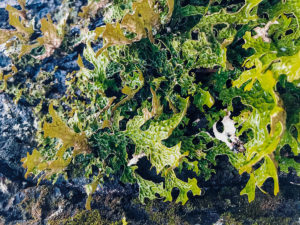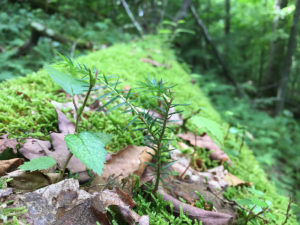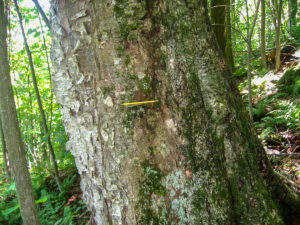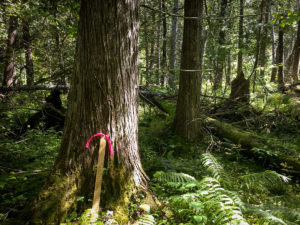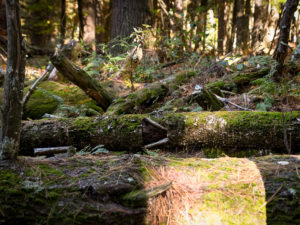Old Growth: wonders and mysteries of our ancient forests
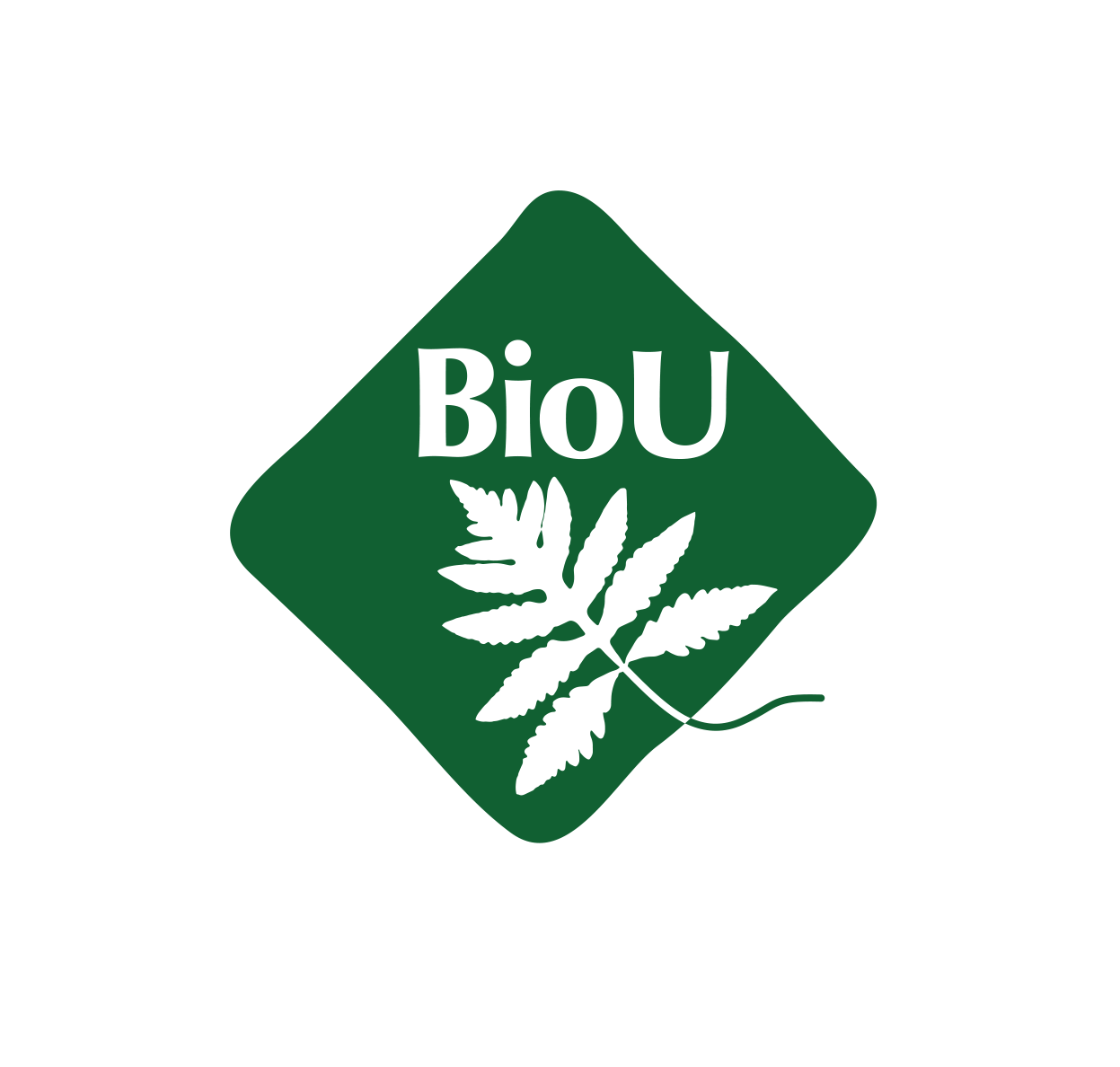
Instructors: Liz Thompson and Bob Zaino
July 17-18, 2021 | $265
Course size: 12 students
Please Contact Us to request scholarship assistance
O
ld forests capture a special place in our imagination, and they provide important ecological functions, especially in a changing climate. In this course, we will visit some of the few remaining patches of old forest in Vermont. We will start by considering the history of Vermont’s forests, and learn why old forests are now so rare on the landscape. We will discuss and explore the unique characteristics of old forests, and we will learn how to recognize old forests in a variety of ecological settings. We will identify indicator mosses and lichens, dig into the biotically rich soils, and use an increment borer to study tree rings. Finally, we will reflect upon the science and practice of conserving and restoring old forests in Vermont.
Course Goals and Objectives
- Become familiar with the history of Northeast forests, particularly in Vermont.
- Learn how to recognize an old forest when you see one
- Visit some of Vermont's old forests
- Learn about ecological research related to regional old and old-growth forests
- Learn about the underground world of old forests
- Explore some confusing terms: old forest, old-growth forest, ancient forest, virgin forest, primary forest, forest primeval, etc.
- Identify the trees, lichens, mosses, and other species common to Vermont’s old forests.
- Learn a few basic field ecology techniques
- Consider the social and ecological aspects of old forest conservation
About the Instructor(s)
Liz Thompson and Bob Zaino, together with Eric Sorenson, are co-authors of Wetland, Woodland, Wildland, A Guide to the Natural Communities of Vermont, second edition published 2019 and distributed by Chelsea Green Publishing.
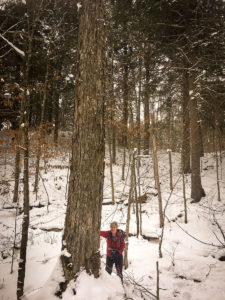 Liz Thompson is an ecologist and botanist with a deep passion for nature and an abiding, lifelong interest in patterns of plant distribution. She is devoted to the conservation of special and wild places, and she makes that the keystone of her work. She is a conservation scientist with the Vermont Land Trust, where she brings nature conservation to the working landscape. She has been deeply engaged in a journey of learning about old forests, and has been sharing that learning through events and publications. Liz studied botany and ecology at the University of Maine, the University of Michigan Biological Station, and the University of Vermont.
Liz Thompson is an ecologist and botanist with a deep passion for nature and an abiding, lifelong interest in patterns of plant distribution. She is devoted to the conservation of special and wild places, and she makes that the keystone of her work. She is a conservation scientist with the Vermont Land Trust, where she brings nature conservation to the working landscape. She has been deeply engaged in a journey of learning about old forests, and has been sharing that learning through events and publications. Liz studied botany and ecology at the University of Maine, the University of Michigan Biological Station, and the University of Vermont.
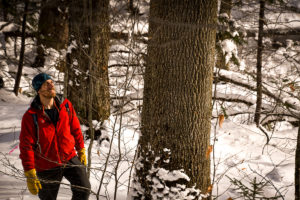 Bob Zaino is an ecologist who revels in exploring the natural world. As a scientist with the Vermont Fish and Wildlife Department, he works to understand the patterns, distributions, and myriad species of Vermont’s natural communities. His field work on state-owned lands has led him to many of Vermont’s remnant patches of old forest. As a hiker, climber, and paddler, he relishes spruce-clad mountains, granite cliffs, and remote northern waters. Bob strives to connect people to nature, and to protect plants, animals, and wild places for the future. He is a graduate of Bowdoin College and has a master’s degree from the University of Vermont’s Field Naturalist Program.
Bob Zaino is an ecologist who revels in exploring the natural world. As a scientist with the Vermont Fish and Wildlife Department, he works to understand the patterns, distributions, and myriad species of Vermont’s natural communities. His field work on state-owned lands has led him to many of Vermont’s remnant patches of old forest. As a hiker, climber, and paddler, he relishes spruce-clad mountains, granite cliffs, and remote northern waters. Bob strives to connect people to nature, and to protect plants, animals, and wild places for the future. He is a graduate of Bowdoin College and has a master’s degree from the University of Vermont’s Field Naturalist Program.
Physical Expectations and Gear
We will be hiking in some relatively steep places, off-trail on uneven terrain, and potentially covering a few miles each day. However, our pace will be relaxed and slow, for the most part. Wear sturdy hiking boots and bring hiking poles if you are so inclined. Bring water, lunch, snacks, raingear and insect repellent. We’ll be mostly in the woods, rain or shine, bugs or no bugs!
Recommended Reading
We will provide other optional readings and resources as the time gets closer. To start with:
- We recommend that you acquire a copy of the second edition of Wetland, Woodland, Wildland (see reference above) and read at least pages 90-110 before the course begins. Nearer to the beginning of the course, we will assign additional pages.
- Here is a 2019 episode of Brave Little State, featuring Bob Zaino who helps answer the question: Does Vermont Have any Patches of Old Growth Forest?
- And a 2020 webinar by Liz Thompson and her VLT colleague David McMath: Old Growth Forests: What they are, why they are important, and a Virtual Tour.
- This is a great 2005 VNRC publication to introduce you to the topic of old forests.
- A fascinating 2020 story about the underground world of old growth forests of the Northwest can be found here,
Meals
Due to continued concerns around COVID-19, meals and beverages will not be provided this year. We ask that you please bring your own food.
Timing
We will meet in the field (location to be determined) at 9 AM on Saturday, July 17th, and finish in the field at 5 PM on Sunday, July 18th. Saturday evening will be free after 6 PM.
Academic Credit / Professional Development
This course qualifies for 1 graduate-level science credit for an additional $150 course fee. All BioU courses are accredited by Castleton University. It is the student’s responsibility to ensure that home institutions will accept the credit. Participants pursuing academic credit will be required to complete an additional assignment above and beyond the course hours, including literature review, reflective writing, or a field-based project.
This course qualifies for 20 hours of professional development hours and continuing education units. Certificates of completion are provided at the conclusion of the course.
Cancellation Policy
While we realize that unexpected circumstances arise that are out of our control, North Branch Nature Center cannot guarantee refunds for registrations cancelled within 30 days of the course. If a cancellation occurs within this window, NBNC will attempt to fill the space from our wait list and provide a full refund. If the course needs to be cancelled within 30 days of the program, NBNC will provide a full refund. If you need to cancel due to concerns related to COVID-19, a full refund will be provided up to 48 hours before the course.
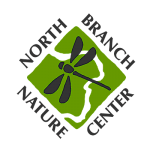
713 Elm Street
Montpelier, Vermont 05602
(802) 229-6206
Hours: Center Open Monday-Friday 9-4
Trails Open 24/7

